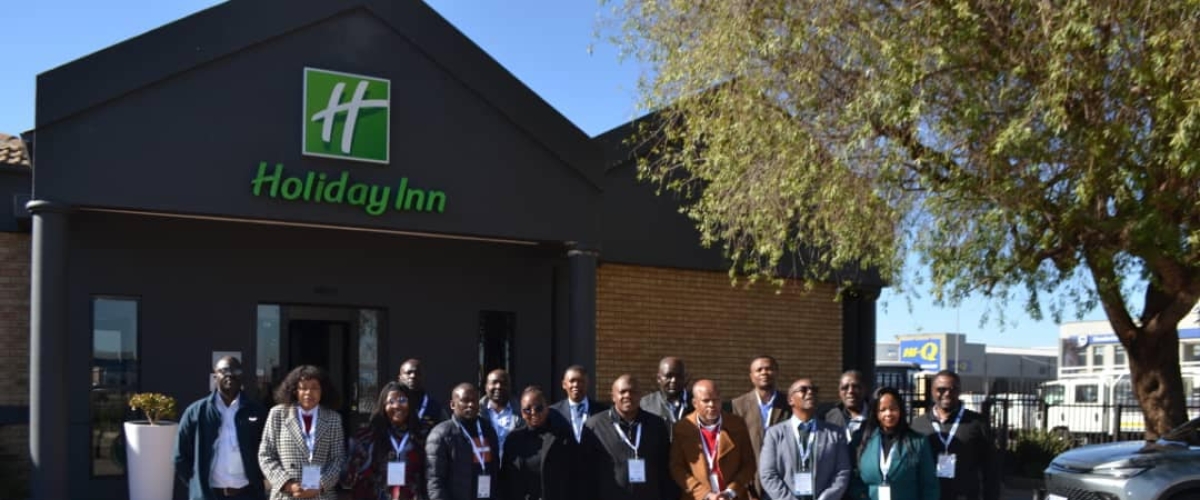
Johannesburg, South Africa – July 12, 2024—From July 9th to 11th, 2024, the CAADP-XP4 Programme, in collaboration with Stellenbosch University's Faculty of AgricSciences, hosted an inception workshop in Johannesburg on the development of an Agri Management Database System (AMDS) to enhance real-time data collection across agricultural value chains through mobile-user-based solutions. The event was themed around enhancing innovation, technology utilization, capacity building, and entrepreneurship skills among agricultural value chain actors to improve livelihoods.
The AMDS, a user-driven mobile-based solution, is being developed to support farmers of all types, including subsistence, smallholder, and large-scale commercial farmers in the region. The system, which began as a PhD study at Stellenbosch University between 2019 and 2022, has evolved into a significant project within the university's Agri-Innovation hub of the Faculty of AgriSciences, promising a brighter future for agriculture in the region.
Dr. Baitsi Podisi, CAADP-XP4 Coordinator, emphasized the significant progress made in regional agricultural R&D and innovation during his opening remarks. "We have seen increased regional collaboration, successful implementation of innovative projects, and improved capacity building," he said, instilling a sense of encouragement and hope among the stakeholders. He also encouraged them to commercialize their innovations beyond scientific publications. He urged universities to undertake more community outreach to demonstrate the value of research and science in addressing societal challenges.
One of the AMDS's key features is its ability to address the chronic issue of insufficient farm, country, and regional level time series data about farming activities. The system is designed to interact directly with farmers, extension services, and other critical sources to collect real-time, accurate data. This data is crucial for informing policy interventions at various local and regional levels.
"The AMDS addresses the eternal problem of lack of reliable farming data," said Dr. Obvious Mapiye. "We empower smallholder farmers, countries, and regional organizations by providing access to high-quality primary data and Agri-Services, driving agricultural growth and sustainability."
The system's current design allows data collection through in-app user registrations, farmer record-keeping, knowledge exchanges, and periodic surveys. These functionalities generate valuable insights into farmers' needs and develop actionable solutions. The AMDS's capabilities can complement regional initiatives like the Southern African Development Community's (SADC) Livestock Information Management System (LIMS) and the Agricultural Information Management System (AIMS).
The SADC AIMS platform, a web-based application, stores data related to twelve thematic areas, including crops, livestock, and socioeconomics. By utilizing the AMDS, the risks associated with AIMS, which relies solely on government data often regarded as inaccessible, can be mitigated.
Dr Edward Nengomasha highlighted the importance of developing a robust, sustainable, and adaptable database system. "Planning, primary data source involvement, operational aspects, and the integration of AI are critical," he noted, drawing from experiences in Tanzania and the implementation of AIMS, LIMS, and AMDS.
Dr. Anthony Kigombola stressed the need for systems that address specific pain points or provide incentives to end users. "Technology has a cost; the organization should set aside a budget to sustain these projects," he advised. "Systems can be designed to include revenue streams whenever possible."
When discussing LIMS, Gaolathe Thobokwe stated, "LIMS is not just a database or application but a system for collecting, collating, analyzing, and sharing regional livestock information."
Ms Mashudu Nxumalo explained innovative technology as a new or significantly improved product, service, or process that offers unique benefits or capabilities. She also led a session on the business model canvas, facilitating group discussions to explore and develop business models.
This training workshop highlighted the importance of innovation and collaboration in advancing agricultural value chains and improving farmers' livelihoods across the region. With the continued development and implementation of the AMDS, the agricultural sector is poised to make significant strides in data-driven decision-making and sustainable growth.
The meeting was attended by agricultural and social scientists from public research institutes and universities, data curators from national statistical Bureaus and programs, ICT experts, and policy advisors from selected SADC Member States (Botswana, South Africa, Tanzania, and Zimbabwe). This event was supported under the EU-funded CAADP-XP4 programme CCARDESA is implementing in the region.





